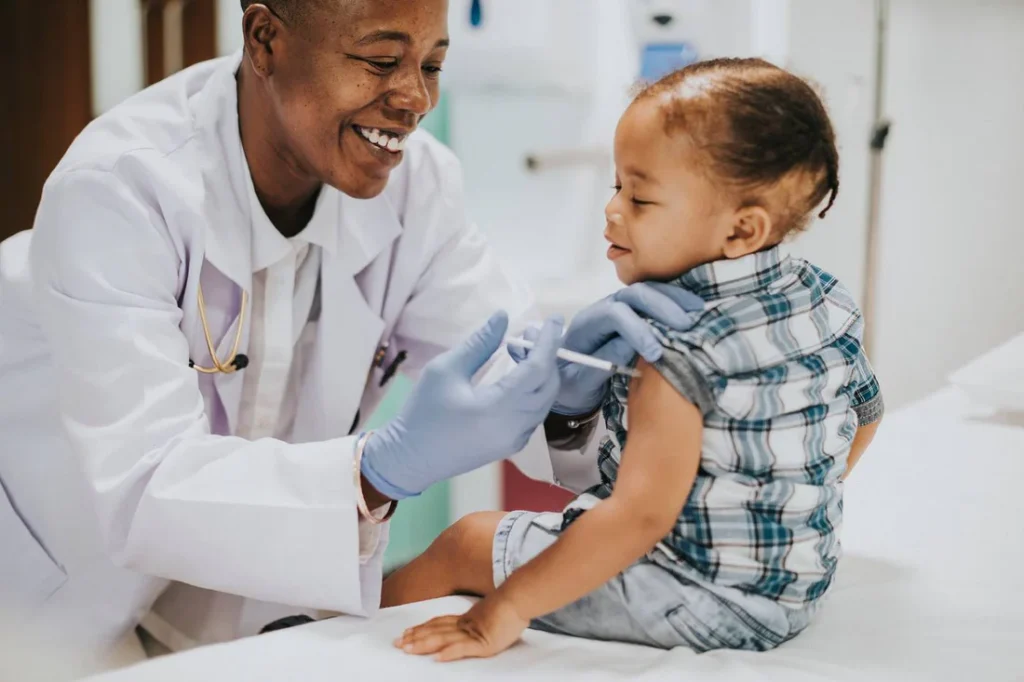
What Are Vaccines and Why Do Babies Need Them?
Vaccines are special shots that help keep babies from getting sick. They train the immune system to fight off diseases before they happen (CDC, 2023). Getting vaccines on time helps keep babies safe and healthy (WHO, 2023).
Vaccine & Immunization Schedule: English
Vaccine & Immunization Schedule: Spanish
Why Are Vaccines Important?
- Protects from serious diseases – Vaccines stop babies from getting sick with dangerous illnesses like measles, polio, and whooping cough (CDC, 2023).
- Helps the immune system – Vaccines teach the body how to fight diseases so babies don’t have to get sick first (AAP, 2023).
- Keeps everyone safe – When many people get vaccinated, it stops diseases from spreading (NIH, 2023).
- Reduces doctor visits – Vaccinated babies are less likely to get sick and go to the hospital (WHO, 2023).
- Prevents antibiotic resistance – Fewer infections mean fewer antibiotics, which helps keep medicine strong for when it’s needed (WHO, 2023).
- Safe and tested – Doctors and scientists make sure vaccines are safe before giving them to babies (FDA, 2023).
Vaccines Babies Need from 0-1 Year
At Birth
- Hepatitis B (HepB) – 1st Dose
- Protects against hepatitis B, a liver disease that can cause lifelong infection and liver failure (CDC, 2023).
1-2 Months
- Hepatitis B (HepB) – 2nd Dose
- Continues to protect against hepatitis B and helps build lifelong immunity (WHO, 2023).
2 Months
- Diphtheria, Tetanus, and Pertussis (DTaP) – 1st Dose
- Prevents whooping cough, tetanus, and diphtheria, which can cause breathing problems, paralysis, and death (NIH, 2023).
- Haemophilus Influenzae Type b (Hib) – 1st Dose
- Protects against bacterial meningitis, a serious brain infection (WHO, 2023).
- Polio (IPV) – 1st Dose
- Prevents polio, which can cause paralysis and lifelong disabilities (CDC, 2023).
- Pneumococcal (PCV13) – 1st Dose
- Protects against pneumonia, ear infections, and meningitis.
- Rotavirus (RV) – 1st Dose (Given by mouth, not a shot.)
- Prevents severe diarrhea and dehydration, which can be dangerous for babies (NIH, 2023).
4 Months
- DTaP – 2nd Dose
- Continues protection against whooping cough, tetanus, and diphtheria.
- Hib – 2nd Dose
- Further protects against bacterial meningitis and pneumonia.
- Polio (IPV) – 2nd Dose
- Strengthens immunity against polio.
- Pneumococcal (PCV13) – 2nd Dose
- Boosts defense against ear infections and pneumonia.
- Rotavirus (RV) – 2nd Dose
- Continues protecting against severe diarrhea.
6 Months
- DTaP – 3rd Dose
- Ensures continued protection from whooping cough, tetanus, and diphtheria.
- Hib – 3rd Dose (if needed, depends on the vaccine brand)
- Additional protection against meningitis and pneumonia.
- Polio (IPV) – 3rd Dose (if needed, depends on the vaccine brand)
- Boosts immunity against polio.
- Pneumococcal (PCV13) – 3rd Dose
- Strengthens protection against lung and ear infections.
- Rotavirus (RV) – 3rd Dose (if needed, depends on the vaccine brand)
- Ensures continued defense against diarrhea-related dehydration.
- Influenza (Flu Vaccine) – 1st Dose (Yearly, starting at 6 months.)
- Helps prevent serious flu complications.
9 Months
- Hepatitis B (HepB) – 3rd Dose (if not given earlier)
- Provides long-term protection against liver disease.
- Influenza (Flu Vaccine) – 2nd Dose (if needed, depending on flu season)
- Strengthens flu immunity.
12 Months
- Haemophilus Influenzae Type b (Hib) – Final Dose
- Completes meningitis protection.
- Pneumococcal (PCV13) – Final Dose
- Strengthens ear infection and pneumonia defense.
- Measles, Mumps, and Rubella (MMR) – 1st Dose
- Prevents measles, mumps, and rubella, which can cause serious complications.
- Varicella (Chickenpox) – 1st Dose
- Stops chickenpox, which can be severe in babies.
- Hepatitis A (HepA) – 1st Dose (2-dose series, second dose given 6 months later.)
- Protects against liver disease from hepatitis A.
How Do Vaccines Work?
- Trains the body – Vaccines teach the immune system to fight diseases (WHO, 2023).
- Keeps babies from getting sick – Instead of catching a disease, the body learns how to fight it safely (AAP, 2023).
- Prevents outbreaks – Fewer sick people means less spread of disease (CDC, 2023).
Final Thoughts
Vaccines keep babies healthy and safe. Following the vaccine schedule makes sure they are protected at the right time. If you have questions, talk to your doctor to keep your baby on track!
Video resources:
English:
Spanish
Bibliography
- Centers for Disease Control and Prevention (CDC)
- Vaccines for Children Program
- Retrieved from: https://www.cdc.gov/vaccines-children/reasons/index.html
- Centers for Disease Control and Prevention (CDC)
- Polio Prevention and Facts
- Retrieved from: https://www.cdc.gov/polio/index.htm
- Centers for Disease Control and Prevention (CDC)
- Hepatitis B Statistics
- Retrieved from: https://www.cdc.gov/hepatitis/statistics/index.htm
- World Health Organization (WHO)
- Immunization Coverage
- Retrieved from: https://www.who.int/news-room/fact-sheets/detail/immunization-coverage
- World Health Organization (WHO)
- Meningitis and Vaccination
- Retrieved from: https://www.who.int/news-room/fact-sheets/detail/meningitis
- World Health Organization (WHO)
- Antibiotic Resistance and Vaccination
- Retrieved from: https://www.who.int/news-room/fact-sheets/detail/antibiotic-resistance
- National Institutes of Health (NIH)
- Vaccine Research Center
- Retrieved from: https://www.nih.gov/news-events/vaccine-research-center
- National Institutes of Health (NIH)
- Rotavirus Vaccine Research
- Retrieved from: https://www.nih.gov/news-events/rotavirus-vaccine-research
- National Institute of Allergy and Infectious Diseases (NIAID – NIH)
- DTaP Vaccine Information
- Retrieved from: https://www.niaid.nih.gov/research/dtap-vaccine
- American Academy of Pediatrics (AAP)
- How Vaccines Work
- Retrieved from: https://www.healthychildren.org/English/safety-prevention/immunizations/Pages/How-Vaccines-Work.aspx
- U.S. Food and Drug Administration (FDA)
- Vaccine Safety and Approval Process
- Retrieved from: https://www.fda.gov/vaccines-blood-biologics/vaccines
Legal Disclaimer: The information provided by our nonprofit is for informational purposes only and not a substitute for professional medical advice, diagnosis, or treatment. Always consult a qualified healthcare provider for medical concerns. We make no guarantees about the accuracy or completeness of the information and are not liable for any decisions made based on it. If you have a medical emergency, call 911 or seek immediate medical care.


